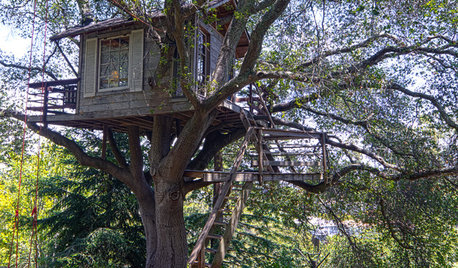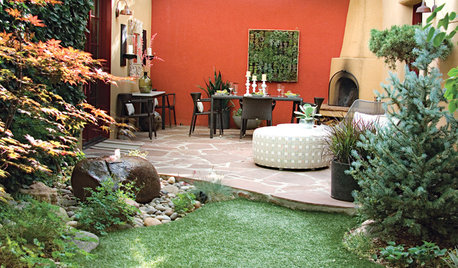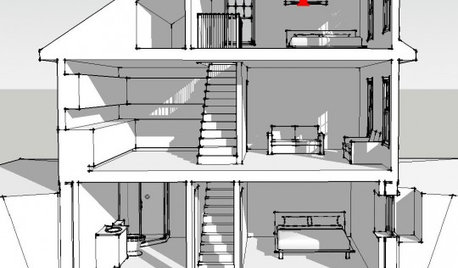making a living wage.
Does anybody here make your living solely from only market gardening? Are you comfortable? Would you do it again? Change anything? Please tell me about your job satisfaction.
I understand turning an enjoyable hobby into a career can make it less enjoyable, but I think I want to make this change. I have owned my own construction business for 25 years. I understand it can be hard on the body but it can't be any worse than construction.
Comments (54)
brookw_gw
12 years agolast modified: 9 years agoMy farm is for my retirement. There is no way we could live on what it brings in; but in a few years it should be my full time job and bring in some decent income. We did go into debt, paying off the land and buying a tractor. I have absolutely no regret doing this as the land has increased in value and the tractor has not declined in value. Having a little debt also saves you in taxes with depreciation and deductibles. This summer, I'm having a pond dug, and next summer I'm putting up a pretty big building.
One of my biggest investments has been in fruit. Trees take many years to become productive. So do asparagus, grapes, and berries. Vegetables pay my bills, but fruit makes a lot of profit. Then again, you have a lot of up front cost with no return for awhile. You also have to build structures, etc. The good thing is they are there for a long time and only improve over time.
Finding your niche in a market may be the key to succeeding. We have diversified in 3 different areas and have found if one diminishes the other one or two pick up the slack. We currently do 2 farmers markets (will probably do 3 or 4 this year), supply a couple restaurants, and have an online business. We were supplying a store but moved on to other things. I wouldn't mind doing that again in the future. I'm pretty much a one man operation, now that (fortunately) my wife is working again and my kids are grown; I'm also a full time teacher and college adjunct. It's also difficult that my farm is 30 miles from my house.
You see a lot of folks start up and then fizzle out. This business demands an incredible commitment, but it's been the most rewarding thing I've ever done.
jrslick (North Central Kansas, Zone 5B)
12 years agolast modified: 9 years agoMarla,
That is the truth. I am pretty sure I have narrowed down my selection to a few models. I am looking for a 20-30 HP tractor with a 4 wheel drive, front end loader and tiller. In the future, I want to be able to lay plastic mulch with it too. However, right now I am ok with doing that by hand. I also have built a disc bedder. Hopefully, I will be able to test it out this weekend.
I could get a bigger tractor, probably cheaper, but it doesn't fit my farm. I can borrow larger equipment from family and neighbors, if I need it. No use having a 75-90 HP tractor if I am only going to use 25 of those horses! Also, I need a narrow wheel base. I also would like to try to be able to use it in the high tunnels too. However, that is a lower priority as those beds are very easy to work with my tiller.
Related Professionals
Erie Landscape Architects & Landscape Designers · Havre de Grace Landscape Architects & Landscape Designers · Clermont Landscape Contractors · Wilmington Landscape Contractors · Amesbury Landscape Contractors · Bainbridge Island Landscape Contractors · Columbine Landscape Contractors · Essex Landscape Contractors · Forest Hills Landscape Contractors · Fort Worth Landscape Contractors · La Vista Landscape Contractors · Overland Park Landscape Contractors · Petaluma Landscape Contractors · Wallingford Landscape Contractors · Weymouth Landscape Contractorsjcatblum
12 years agolast modified: 9 years agoJay I saw you want to lay plastic in the future with your potential tractor. A plasticulture contractor in my parts has to lay plastic with 6 ft between each plastic row since the tractor is so big. If they get any closer the tires end up on top of the plastic & rips the plastic. Stick to the 20-30 HP plan.
You should have made the drive to the Oklahoma Plasticulture conf in OKC this yr. Keith Stinnett from Tecumseh OK had built his own plastic layer & his own water wheel transplanter. I am sure if you google him & you can find his contact info to find out more about how he built these. I know to make the raised beds he used an old brush hog with angle iron welded onto the bottom. Good luck!
myfamilysfarm
12 years agolast modified: 9 years agoJay, you can email me and I'll tell hubby. He's done a lot of research on different tractors, and can keep his eye out for something nearer to you. He agrees less than 50 hp, and there are alot of tractors that will suit your needs.
You will need a wider wheel base for a loader, with the narrower wheel base is a problem with tipping over. Alot of the tillers will work with 20-30, but will work better and last longer if they have alittle more hp.
A shorter tractor, utlity, will work better in your high tunnel. The little Kubotas, and Fords would be your best bet. Fords would be cheaper, anywhere from $2500-$5000, but the 8N and 9N are not powerful enough to run a 5' tiller, 4' tiller could be ran off of a 20 hp tractor. (Personally, I like the 5', gets things done alot faster). Plus the 8N-9N are geared faster than the tillers and transplanters, so I've been told by vegetable growers that have been doing vegetables for decades.
Marla
Jon_dear
Original Author12 years agolast modified: 9 years agoHello all...
Yes Marla... I agree a tractor would be very useful. However, up front cost will be prohibitive. For the short term do you guys think a troybuilt rototiller would do it for me or should I consider a walking tractor?
Yes Jay... I would have every intention to build some tunnels. Even here in Maine I'm sure the return would be quick- cool season crops, tomatoes and melons in summer and other uses. My plan would be an acre or two in field crops with a few thousand feet under cover.brookw- I agree with the fruits and such. I was planing something in that area. I believe diversity is key. The lady in my life would like to do cut flowers as well. Originally I thought of building a greenhouse to sell flower and vegetable transplants, so this would be a natural progression of this. My advantage is, I can and would build my own buildings as required.
Marla and Jay - Is it worth having a tractor big enough to pull a potato digger?
myfamilysfarm
12 years agolast modified: 9 years agoJon, we have a rear-tine SuperBronco Troybilt, with a reverse. Definitely for the reverse. Alot of tillers don't have that. Our Troybilt, we bought about 10 years ago and we have worked the devil out of it. Our biggest problem with it is that the tires need to have some slime put in it. It still starts within the first 2-3 pulls, with someone that knows how to pull it.
A potato digger can be as simple as a middle-buster on 3pt tractor, small Ford will work if your ground is loose (not totally rocks). Otherwise, a good tater fork and back power.
Jon, BTW, my hubby was in construction before he was 16, and now 60. If we are assuming that you are less than 50, and haven't totally destroyed your body, you are probably making a good change at that age.
If you can liquidate some of your construction tools, depending upon what type of construction you did, you might look into investing in a BCS tractor, which I've heard are wonderful. I don't have one, never enough money.
Also, before you quit working, get your bills as slow as possible.
I have been selling veggies plants for the last few years. Started out, just adding a few extra plants above the ones I wanted for my own. Now, I double, if not more, the amount that I want to plant, just to retail. Now I have a high tunnel, I'm planting even more. I'm going to run out of room, AGAIN, soon.
Marla
bi11me
12 years agolast modified: 9 years agoJon - I've got the BCS 835 and four hoophouses - a little over $12K with the attachments, but the hoophouses pay for themselves in less than 2 years. When I started, I hired a local farmer to do some tractor work for me for the first few years - much cheaper than an investment in a machine that will only depreciate. That said, there are lots of old tractors in Maine for sale and still kicking.
The BCS is a workhorse, I have a chipper/shredder, 30" tiller, 2 hiller-furrower blades, the rotary brush cutter, snow blower, and a finish mower. I use it to make money on other properties occassionaly as a design/build garden service, which is quite lucrative if you play it right.
A few more notes. Maine has a great support system for small businesses, and MOFGA has lots of information and classes on small-farm start-ups. Do a real business plan to get started, which will open a lot of doors to free services from SCORE and a lot of other start-up resources. If you are a job creator as well, you may gain access to state and federal grant money, and SARE is another good place to explore. A business plan is no small amount of work, but it forces you to do the math, to analyze markets realistically, to carefully estimate expenses, including paying yourself, insurance, marketing costs, etc.
One of the biggest problems is that affordable land for growing is rarely near to good markets. A rural farm can't get by just on a farm stand and CSA because the population density and income demographics won't often support it, and more lucrative markets may include transportation costs and travel time. You also have a seasonality issue, there may be tourism in summer, or even with skiers and leaf-peepers, but late winter, when the heating bills are adding up and you have a few thousand dollars of seed to pay for, can be a bit of a hurdle. A good business plan can get you a line of credit to get past that lean time, and it is wise to develop that relationship with the bank should something catastrophic occur.
The two most common causes of small-farm failures are inadequate or unrealistic planning, and under-capitalization. If you own the land, have most of your retirement plan taken care of, and know who is going to buy your stuff before you plant it, you'll find it a satisfying vocation that will pay the bills, but it's very hard to get rich.
myfamilysfarm
12 years agolast modified: 9 years agoI just had 2 people email me asking if I would start their seeds that they had purchased, for them. I'm going to attempt this, sort of a personal grower. I'll keep you posted how this goes over.
Marla
2fennelshirts
12 years agolast modified: 9 years ago(Jon)for making a living wage, my husband is retired, the market thing is my job (my husband does the fall and spring plowing/tilling for me(4' tiller).He grows hay/oats, I do ALL the market stuff myself, I make Good $, enough that we don't touch any of the retirement $ from mid April thu the end of October. It will be longer this year, as I found out yesterday that I was APPROVED for the NRCS hightunnel program (they came to my house and I signed the contract, now just waiting for the funds to be transfered to my bank. (Marla) I started seeds for one guy,14 years ago, I was only growing annual/perennial flowers and veggie plants to sell back then, not many plants for myself at that time. I started 2,000 of a few diff kinds of tomatoes and some(?) melons, he picked the plants up when he said he would and paid me (I don,t rem how much $, I don't have that years tax papers anymore).About 4 years ago I grew for another guy, a doz of this and that (300 plants), by the time he came and picked them up (5 weeks later then he said) by then the plants were all stressed out, too small of pots. We only had an agreement of so long/up to 3" pots. So make sure you have an agreement and maybe $$ 1/2 down.
Debmyfamilysfarm
12 years agolast modified: 9 years agoDeb, Congrats on the hightunnel info, I'm sure glad I was able to post the info and someone benefitted.
Thanks for the tips, they have bought the sends and I checked Park's chart to estimate how long it would take up to 4" pots. Their will be perfect for planting, if I can get the seeds SOON. About 8-10 weeks til appropriate planting for tomatoes/peppers.
Just got an email back from her, she grows lamb for a farmers market, so she's not a yuppie that doesn't understand growing. It looks like we have a deal.
Maybe I'll be starting a new tangent of the business, at least, I won't have as much bending over.
Marla
elrem2002
12 years agolast modified: 9 years agoOne thing you may find if you get into this farm/garden/market business is you will have a lot less time for the computer forums etc. We have been very busy the last few days getting ready for the first shipments of plugs and bare-root plants coming next week and some of the employees coming back for the year. And it will stay busy, we hope, until December.
This subject of making a living in this business has come up a few times in the past but I think this post has drawn the best advice and suggestions.
One thing I do feel strongly about, and I'm going out on that limb with Marla, NO DEBT, except for real estate. I never borrowed a dime except for the mortgage. That goes against the advice of the business gurus and bankers. If you have BIG plans and are in a hurry then beg borrow or do what it takes to give it a try. However, I think the endeavor will be more enjoyable and likely to succeed by growing within its means.
On some posts before I told the story how my wife and I got married in 1965 and moved into an old dilapitated house with 13/4 acres we bought. That spring she put a couple bunches of rhubarb out by the road and it sold right away. So she put out some bunches of wild flowers and bunches of dry grass. Everything sold. That winter we ordered some seeds and gladiola bulbs. We had the neighbor plow up all our land. On July 10, 1966 I quit my job and neither of us have had an off farm job since. Just kept putting things out by the road and started selling at a farmers market. Built a couple small aframe greenhouses. Bought some more land. Built more greenhouses. Now we have a nice small nursery business with 6 to 10 employees,still go to market, do some traveling, and our daughter is taking this thing to the next level. That's a very condensed version of a long long story.
I didn't do it because of some romantic ideal. I did it because I thought we could make some money. I had no inheiritance, no family, no education. My wife had no money but she had gone through high school and two years of college. We worked hard because our backs were against the wall so to speak. I did have some experience. I had never done anything since a child but work on farms or nurseries.
I bought a front tine Merry Tiller in 1966. What a little workhorse! It still runs and my daughter is using it in her market garden. In 1971 I went to an auction and was lucky. Got a Farmall 140 plus cultivators and a 6 foot tool bar for 600.00. I was offered 900.00 for it before I left the auction. It has done a lot of work for me. Lots of plowing, fitting, plastic laying, bush hogging etc. Still runs as sweet as ever.. I was offered 3000.00 for it a couple years ago.In 1984 I bought a Troy Bilt Horse. It's a good machine but not as good as a BCS. It still starts easy and is used a lot. In 1993 I bought a CaseIH 495, about 45hp with a big bucket on the front. Really nice to have when we put poly on the big greenhouses. Also have a 72" Kuhn rototiller on it, something I wish I had had long ago.
Sorry to ramble on. When you get old you accumulate too many old stories.
myfamilysfarm
12 years agolast modified: 9 years ago$600 in 1971 was ALOT of money, for those of you that don't remember the 70s. We bought a GardenWay by Troybilt and our tiller mechanic wanted to trade his Horse for it, because it was SO much better. Can't get them anymore, as far as I know.
Before that we bought one of those MerryTillers, sold it to a landscape company that son worked after they borrowed one day. I think they still have it.I don't think I want to get to the size of having 6-10 non-family employees. We do have 5 grandkids that are getting interested in planting/marketing/basically just making money. Ages 4-10, just getting to the ages of being real helps without realizing how much they're worth. Only can get about 1 hr at a time out of them, tho.
I'm starting to take things out to the hoop house tomorrow, we are not calling for anything less than 42 in the next 2 weeks. fingers crossed. I'm on this forum during breaks and after dark. No lights in the hoop house.
Marlajrslick (North Central Kansas, Zone 5B)
12 years agolast modified: 9 years agoelrem2002: Loved to hear your condensed story. I feel as if we have been in the same boat. Got in market farming for fun, then to make money and now because I enjoy it more than anything.
I just finished an all day til-a-thon with a rented tractor. A Kubota L275 and 4 foot tiller. The tractor didn't look that big, (use to using 150 plus HP tractors) however, I soon learned that this tractor was as big as I needed,if not too big!
So, it seems to me, I know what size of tractor I am looking for, when the money is available.
Jay
myfamilysfarm
12 years agolast modified: 9 years agoJay, that size of Kubota sounds like what we rented for the first few years, but with a 5' tiller. LOVE it, except the price.
Marla
boulderbelt
12 years agolast modified: 9 years agoMy Husband and i have been full time farmers for the past 11 years. We make our living on about 4 acres of our 9 acre farm. In the past we have done farmers markets, a CSA and have a farm store. This year we will do CSA and farm store only (though thinking about picking up a couple of restaurant accounts as so many places that source most of their food locally have opened up in the area).
Like other we carry zero debt except a mortgage (which hopefully will be paid off this year, 15 years early- we decided when we got the mortgage to put as much money as we can towards that and so have been able to pay it down in under 8 years).
We have about 4 acres in 50' x 4' beds and use a 14 HP BCS to do the heavy work. We don't have a 4 wheeled tractor and I doubt we will ever get one.
We used to be certified Organic and still grow as if we were.
We are not rich but make enough to cover our costs and but back money in savings. When we get the mortgage paid off we should be able to bank some serious money and be able to buy that big green house we have always wanted (unless we have to replace a barn roof or something)
myfamilysfarm
12 years agolast modified: 9 years agoLucy, with your beds, a 4 wheel tractor probably wouldn't help you as much as those of us that don't have beds.
I do have a question for you, how many beds did you start with, surely not all of them, right?
BTW, the greenhouse/hoop house has been lovely this past week or so. My onions have sprouted just fine in there with just a row cover over them. It's making it much easier to find places for all the plants.
I didn't have a mortgage, since I was lucky enough to inherit my land.
Marla
rustico_2009
12 years agolast modified: 9 years agoBeing new maybe I shouldn't try to answer this question, but I do kind of know where I am going and why.
I won't be able to push this into the making a living category because of our ground water situation.
We are some what "comfortable", safe from disaster anyway, due to low bills, rental income and my wife's job which provides health insurance. So this is my "semi-retired poor" job. I hope I can do it for 15 years or so. I never really planned to be a farmer but defected from other things....I wish I had made it a goal early on and targeted truly agricultural land that is better situated.I need some money just as much as the bigger guys need more.
I bought 100 chickens for eggs, to help with having enough things to sell. I am targeting about $2k per month average profit in all. No employees, probably occasional help.It shouldn't be hard to exceed that goal. Like the others said, I don't expect to meet it for a few years. We are allowed to broker two other certified producer's harvests at the FM's, so that could add some less difficult to earn $.So, other than the money: I am happy with the people I meet and our interactions, more than with any other employment ever. (I had a general contractors license for 12 years). I don't have any moral doubts about how my work affects the world...(much less values conflicts). I like working farmers markets as much as I like fishing and it pays(and there are not many fish left out here). I get to be with my kids more and there are many valuable experiences in it. My kids are on first name basis with some friendly chefs and have seen their businesses from the
back door in. They get to meet all the kooky vendors who are really great to them. My kids have part time employment when they are ready(or not).It has been one of the hardest things I have ever done to try to learn how to establish a good harvesting cycle. I am still not there yet. This has had some effect of making the hobby not fun, and you may go through that. Getting better at it with time, building up necessary implements etc should minimize that. More previous experience, or close mentors could be a boon.I hope that it works out for you.
boulderbelt
12 years agolast modified: 9 years agoMarla, we started with zero beds and put in 100 the first year and and other 75 the second and the rest a few every year. I think this year we will have no more beds put in, but I could be wrong
myfamilysfarm
12 years agolast modified: 9 years agoLucy, you really were working those first few years, makes me tired thinking about it. No more beds, that's like says 'my greenhouse is big enough', doesn't happen.
Rustico, around here you can get between $3-5/doz for naturally raised eggs. That would really help your bottom line, plus all that free 'manure' (let it age longer than cow/pig, chicken is really hot). Your eggs might add up to 1/2 of your goal, providing you could get those prices and 90% of your chickens are producing eggs.
Marla
Jon_dear
Original Author12 years agolast modified: 9 years agobi11me- I'm torn between a bcs and a troybilt. The bcs sounds great with the accessories available. I'll look into them. I knew the hoophouses were good but I never imagined a two year payback. I'll be in a hurry to get one. I was aware of all the help here in Maine. We learned some of that in "so you want to farm in Maine" course we took last year at the extension office in Bangor. I also know what you're talking about as far as land and being where the people are. I am currently "looking" but am not in a rush at all to run out and buy. I am hoping not to fail, I am planning and trying to learn as much as I can. I am drastically under capitalized (thanks to the ex wife) lol but hope steady growth as I can afford it will work. The advantage I have as a builder is that I don't have to quit a job; I am my own boss and can be more selective of the jobs I take and when I take them.
elrem2002- I think that's great, what you and your wife have done. I too agree about the no debt concept. I read somewhere that Scott Nearing, at a fair in Maine, gave a speech. He said "pay as you go" that was the whole thing... please don't worry about rambling on. I for one enjoy hearing from those with experience.
boulderbelt- So for you the CSA and farmstore are enough for you? I can imagine hitting all the farmers markets would get old after a while. And wow! four acres of raised beds? Lots of long days putting them in I can imagine. As far a being Certified Organic... What was your reasoning for stopping? I can see that your customer base is there so they know you are "organic".
rustico_2009- I like that you diversified with the chickens and eggs as well as the vegetables. I feel this is key- not to have all your eggs in one basket (pun intended). I agree too about the learning curve. I'm hoping to find that mentor(s).
bi11me
12 years agolast modified: 9 years agoJon - the BCS is better not only because of the accessories, but the larger models use better engines. It is fairly easy now to get them serviced as well, used to be more complicated. I go to Union Farm Equipment, they also have good used tractors and some rental equipment.
The right property is a big hurdle. Coastal land has a built-in summer market, but it's hard to afford. I was lucky to get mine when I did, I could never afford it now. Other than that, other tourist areas (think lakes and skiing) can offer a seasonal bump, but the year-round opportunities are limited. The Portland market is excellent, financial and culinary demographics can compete with most any city in the US, but there are a lot of suppliers, so the chefs and retail outlets have the luxury of being very selective.
Because of that, diversity is the key. I grow as wide a variety of crops as possible, including flowers for market, dye plants, basket-making material, coppiced trees for window displays, holiday decorations (pumpkins, corn stalks, wreaths for all seasons) - anything that has a selective and solvent clientele that can extend my marketing season beyond the limited growing season. April and May are the toughest months, because even though I have food crops available, the tourism market doesn't start until June, and won't really pick up until July. Then, until the leaves fall, it's pretty much non-stop. I fill in some gaps with out-of-state sales, but the market must be very high-end to justify the shipping expense, so you need to provide quality and variety that can compete on a national scale, in a very limited market - not easy to get in to.
The hoop houses produce my highest-value crops 11 months out of the year, using Colemans' system as a starting point. Even if you only do seed-starting in spring (for your own crops and for sale), tomatoes in summer, and salad and root crops in fall you should be grossing $5/sq ft or more, with few market restrictions if the quality is good.
Jon_dear
Original Author12 years agolast modified: 9 years agoBill are your tunnels more like rimmels or are they site built Caterpillar tunnels? What size are they. Do you move them?
What is your take on garlic? Worth it? I know chefs love the hardneck varieties because they have big cloves and peel easily. I see them for over 3 bucks a bulb for seed stock but think most people wouldn't spend that for the table. I just saw, in a magazine, a wreath with a bunch of garlic on it. Looked like something you could do to use up any smallish bulbs.
Mushrooms? I plan on trying some for my use. If it pans out would you think they could be useful to draw in people? For the most part I'm trying to find out what works and the mechanics of it BEFORE I'm in the business.
Mostly my plan is to see what kind of land I find. If it turns out to be good ground for apples I may have a dozen or two trees to have SOME apples to sell. I don't want just an orchard. If it turns out the ground is better suited to asparagus I may do quite a few of them. You get the idea, I don't want to fight nature, I want to use what I have to my advantage.
I have learned some good sources for plant materials and seed. What are your thoughts on the suppliers?
Nourse - for strawberries, asparagus, horseradish, many other fruits.
Harris - mostly for seed.
Johnnys - seed and tools
Fedco - seed, soil amendments and fertilizers
Anybody else you recommend or should shy away from?
myfamilysfarm
12 years agolast modified: 9 years agoJon, I'm not in Maine, but before you buy anything, look around. If you're worried about shipping from a difference, buy local. There is a BIG difference in prices for everything.
Personally, I don't use any of the companies that you mention. I have looked at them, but have found other's that beat their prices immensively.
Who I use, all with lower prices/same standards:
Daisy, instead of Nourse, out of MI, have had good plants and good customer service.
Harris, I use Hummert(MO) and Jordan(MN), each company will have their specialty seeds, so you have to check each year.
Johnnys, only for specialties that I don't usually grow, BUT they have some WONDERFUL information in their catalog, be sure to ask for a 'commercial' catalog instead of what you find on the internet (will save almost 1/2)
I use local for amendments and fertilizers, own cows, neighbors horse, local co-op or farm store. The shipping on these items will add up to a small fortune (which I don't have).
Recommendation--order every seed and supply catalog that you can find, even the little guys. Then sit down, choose what you think you might want, set up a spreadsheet and start figuring out who you want to buy from. Questions about certain companies, ask here for comments.
Marla
brookw_gw
12 years agolast modified: 9 years agoWhen it comes to nursery stock that will last nearly a lifetime, you're better off investing in quality. There are a lot of companies out there that lure you in w/their cheap prices, but their products are also inferior and not worth the time you waste finding that out. Two good tree sources are Adams County Nursery and Cummins. Stark and Miller are also decent. You should also be aware that growing tree fruit often demands regular spraying. There are organic methods, but they are very expensive and labor intensive--like bagging. There is also pruning, spreading, and endless thinning.
For berries, Pense and Simmons out of Ark have great plants and great prices. I also love their grapes, asparagus, and rhubarb. As mentioned, Daisy is very good as is Indiana Berry. Nourse is really not that much higher, and their quality is outstanding. You can get blueberries at all of these as well. For currants and gooseberries, Whitman Farms has the widest selection and good prices. DO NOT buy stock at big box stores. They sell plants that don't do well for the area and are often mislabeled. I also prefer bare root over potted stock. Choose varieties that will ripen over an extended period of time to insure a constant supply and steady income. You'll also quickly find out the volume you need to plant to satisfy your market. Every year, I find I don't have enough and put more out.
I'm not as particular about vegetable seeds, but I shy away from expensive seeds--unless it is a highly specialized variety. Local bulk seed is often the way to go--along with seed potatoes and onions sets. I do shell out some bucks for specialty potatoes like blues, all reds, and fingerlings. They make a nice addition to the mix of Kennebecs, reds, and Yukons. Garlic is a great investment, but seed garlic is astronomical. Make an initial investment and save your own from that point on. As Marla indicated, look over all catalogs--then find only one or two in which you can consolidate an order. I also enlist others to order with me to cut the shipping costs down considerably.
boulderbelt
12 years agolast modified: 9 years agodo not buy nursery stock from Jung seeds. I made that mistake once and regretted it. Nourse is great, Johnny's has some super nursery stock (got rhubarb from them and the crowns were huge and healthy and survive 4 years in a very bad spot for rhubarb and yesterday were moved to hopefully a much much better spot so they can thrive) I really like Fedco seeds for seeds. I get things like greenhouse poly, row cover and vegetable tills from Nolt's produce supply in Leola, PA (they are Amish so have no website)
myfamilysfarm
12 years agolast modified: 9 years agoI got a drip tape system from Growers solution, just got it today and haven't looked at it yet. Supposed to be enough for 40 rows 50' long. tomorrow, hoping to open the box.
Keep in mind, that you can buy extra on SOME seed and quantity does save money.
Marla
bi11me
12 years agolast modified: 9 years agoJon - all my houses came from Craigslist or eBay, so the manufacturers vary, but they are similar to what Rimol sells. All of them are 30 x 96, two of them move on rollers to 3 different positions. One of the stationary ones is attached to my potting shed, the other is sited over my irrigation well. All of them are set up for growing in-ground, with double 6 mil plastic and inflation fans, but the two stationary houses have fold-down benches for early season seed starting. I build them with sliding doors to minimize snow shoveling in winter. The stationary ones have 2x4 end walls and 6 mil poly, the moving ones have twinwall polycarbonate end walls and aluminum frames for lightness and rigidity.
Garlic is a good seller, but not a high profit item for me. It is useful because of its planting and harvesting schedule and because it is good for cleaning large areas of soil.
Mushrooms are a great crop that can create year-round income if you have a basement that is warm enough.
I have never been disappointed by FEDCO, and I respect their integrity. Johnny's is expensive but for many specialty items well worth it, and the quality is always excellent. I've been dealing with both of them since I started gardening, and when possible I prefer to buy local. On the other hand, because of the market I sell to, many of my seeds come from Japan, Italy, and France. For nursery stock I typically buy rootstock from FEDCO and do my own grafting with scions from local growers.
I buy tools used, for the most part, either on-line or at auction. If I see a good garden tool available, like a Clarington or a Spear and Jackson or a Sneeboer, I'll get it even if I don't need it, because they will last for decades, and make great gifts for people who know what they are. I have at least 50 shovels, and at least 30 forks, with very few duplicates, because if I have a crew working with me I want them to have the proper equipment. It is frustrating to me to have a job done slowly or imperfectly for lack of the right tool - especially when I'm paying to have it done. Some specialized tools - soil blockers, mechanical seeders, and electronics like automated venting and irrigation systems, I buy new simply because that's the most reliable way, but there is very little damage someone can do to a hoe or a shovel that isn't quickly apparent. All of my tools get sanded and oiled and painted annually, including machinery.
In order of value and utility, for my system, I would rank the houses first, then the E-Z Seeder, the pin-point seeder, the soil block system and the BCS as the fastest return on investment; the BCS mostly because it generates off-farm income fairly easily, and performs a lot of tasks on-farm with just one engine to maintain.
henhousefarms
12 years agolast modified: 9 years agoMarla -
I don't know if you have ever dealt with Indiana Irrigation Company but we found them the most affordable to deal with on drip tape. They are just down the road from you (Onward) and you can pick up from them and save a fortune in shipping.
Here is a link that might be useful: Indiana Irrigation Company
myfamilysfarm
12 years agolast modified: 9 years agoI haven't looked at them, will need to. My shipping was $38 for upgraded priority, They are in KY, just a day's drive, if I needed alot and had time. You know me, I don't mind a day's drive for something that I really want. They told me that if I wanted a greenhouse, just call ahead and they would have it ready to load onto a pickup (super heavy duty) to drive home. A 30x96 CAN fit, but it would be a real load.
Marla
henhousefarms
12 years agolast modified: 9 years agoThirty eight bucks for upgraded shipping isn't too bad. Was it an entire roll or a kit?
Your not afraid to travel - I'll give you that. I never did hear where you got off to after the SIVGS. What kind of price did they have on the 30x96? Sure would like to have one someday.
Jon_dear
Original Author12 years agolast modified: 9 years agowow. You people are GREAT. There is a wealth of information here and I for one, am glad you're not shy about giving it. It is nice to see that "farmers helping farmers" mentality here. In so many trades everything is so secretive. There is power in knowledge. It is constantly evolving. I also believe that there is just so much you can learn by reading, you must also "do". I guess I have to make some decisions about the direction I'm heading and just do it.
moon1234
12 years agolast modified: 9 years agoI think you need to define "Market Garden". That term is bandied about a lot and could define someone with a large backyard garden to someone farming upwards of a 100 acres.
I think that once you get over an acre you are no longer a market "garden" and are farming. If the work you do requires something larger than a BCS tiller for field work you are a farmer.
I was lucky in that I grew up on a farm (160 acres) and my father still farms. I went into computers and it was great for a while. Now I have not received a raise in four years, our profit sharing and 401k match are gone, Christmas and Summer parties and bonuses are gone, etc. Needless to say I am less than thrilled. I make good money (62K) per year so I am not real upset, but there are more and more people in technology every day and I don't see a large pay increase in my future.
I started growing a very small amount of melons about 4 years ago. Just for fun. I think 100 of them. My parents have had a roadside stand selling sweet corn for the last 17 years. I sold almost all of the melons in one weekend. The next year I grew around 500 watermleon and added 500 muskmelon. The year after that I added lots of other things and increased watermelon to 2000 and muskmelon to 2000. This year I am shoothing for 4-5k watermelons and 4-5k muskmelons. We are also upping our tomato plants to 600-700 this year from 400 last year. I upped our onions from 1000 to 18,000 plants. I am shooting for around 6000-9000lbs of onions.
Our expense went like this by year:
1: $10 (seed and a plug tray)
2: $400 (Seed, trays and soilless mix)
3: $5000 (Seed, trays, mix, plastic mulch layer)
4: $15,000 (all of the above plus rainflo transplanter and 16x24 greenhouse)We have never gone into debt and more than doubled our return each year. This year I am shooting for $40,000 in gross profit or a little more.
I did have the benefit of not having to buy land or tractors (Get them for cost of supplies from Dad. He likes free fuel for his work. ha ha) My goal is keep increasing until we hit the $120,000 gross profit mark. Then I will quite my job and farm full time. I need to be able to pay for health insurance and that is a $20K/year expense for me and my family of 9. I would like to have profit of over 60K/year.
I think my goals are easily reachable. I have enough commercial customers to take veggies at retail prices. Farmers markets are ok, but unless you sell tousands of dollars at each one, you will never be able to live anything other than a frugal lifestyle. I want to be able to buy tractors, equipment, etc. without taking out loans. That requires time, dedication and learning. If you want it bad enough you will get it.
I can't say enough about NOT going into debt. It will kill your profit margin and really make you feel beholden to a bank, just like an employer. It is VERY rewarding to just pay for something and then that is it. You OWN it. It will also make you very much despise paying all of the taxes. At least when you sell food there are no sales taxes.
Here are the vendors I use:
Greenhouse and growing supplies:
- Nolt's Midwest Produce Supply: Amish (they do have a phone)
- BFG Supply Corporation: Soilless Mix, etc.
- Irrigation Mart: Irrigation supplies I can't get at Nolt'sSeeds and Plants
- Nourse Farms: All berries, asparagus and rhubarb
- Seedway: Primary supplies of veggie seeds
- Johnny's: Seeds
- Jordan Seeds: Seeds
- Harris Seeds: Seeds
- Stokes Seeds: Seeds Carrys many commercial varieties in small amounts. Expensive
- Filaree Garlic Farm: Garlic seed (when I want new varieties)
- Local farm: Seed PotatoesEquipment:
- Buckeye Tractor Company: Drip tape winders, misc tools
- Rain-Flo Irrigation: Mulch layer and Transplanter
- Farm and Fleet: Steel posts for fencing and tomatoes, farm supplies
- Mid-State Power Eqipment: John Deere dealer in Wisconsin
- BFG Supply: Plug Trays
- Nolts: Plug Trays, etc.
- AMA Plastic: Plug Trays (I like traying different trays)In the end I choose to pay more and buy quality equipment. I figure that I want it reliable, easy to get parts and to last. I always kick myself when I go cheap.
jrslick (North Central Kansas, Zone 5B)
12 years agolast modified: 9 years agoIn Kansas they tax food, so we have to collect sales tax and remit it to the state.
Moon1234, you speak of many truths. My family also farms, I am "Renting" another 1/2 acre from them this year for potatoes and winter squash. I raise everything else at my house. I sell at farmers markets because I don't have a good outlet. It is alot of work, but I enjoy it very much.
Jay
myfamilysfarm
12 years agolast modified: 9 years agoI was told back when I started, that you could get by with a BCS til you were farming 5 acres. Definitely don't buy anything less than 8 hp when 'gardening' over 1/2 acre (it will kill you, or you think).
I did the same as moon1234, except I had the land, but absolutely NO equipment. In our area, equipment is hard to find small enough for just a few acres. Vegetable growing is frowned upon. If you're not growing corn/beans and 1,000s of acres, you're not a farmer.
Unfortunately I was at one of those $1,000+ per day market, but wasn't able to produce enough on our own produce. After 10 years of building the customer base, our market changed their rules, and they felt that we couldn't produce aNYTHING (due to one mouthy vendor, that never visited, but lived somewhat near). They 'said' we didn't meet their requirements, and weren't able to attend. So after 10+ years, we had to start ALL over, at much, much smaller markets. From $1000+ per day to maybe $1000 per season, really hurt. That should be enough reason not to go into debt. I was out over $1500 in seeds (new that year) before I was told and starting looking for new markets. I had over 5,000 tomato plants ready for market, the week before being told.
You can never be sure that you will make a 'living wage', all you know is that you should not starve (always eat your own food).
Basically, if you're asking if you can live on this? Yes and no, you will have to have almost NO expenses that are not related to farming. And be able and willing to preserve whatever you can for your own eating. You should be able to pay the electric/heat and probably phone, mortgage is more iffy (depending upon how much it is, better as $0). Anything else should be paid for. Those new cars/trucks aren't needed, a good used one is much better and cheaper.
Marla
cowpie51
12 years agolast modified: 9 years agoMost farmers markets have this rule but ours does not and I wish it did. To hard to compete with auction truck farmers
Product Rules
A. Product Source
1. At least 70 percent of all products that a Vendor sells must have been produced by that Vendor excluding concessions, with this percentage based on the prices charged by the Vendor. 2. However, the other 30 percent of product or products that a Vendor may sell but that the Vendor did not produce must have been purchased by the Vendor directly from the producer of the product.
3. Vendors may not sell any products that they purchased from wholesalers, distributors, retailers, or in an auction, provided that concessions need not be purchased directly from their producers. Before each market season begins, Vendors must provide to the Market Master the name, address and telephone number of each farmer or other producer whose products the Vendors intend to sell in accordance with the foregoing. Exceptions may be made in the event of acts of God.bi11me
12 years agolast modified: 9 years agoDepending on one market is as risky as depending on one crop. Diversity has to be built into the system, so if one thing fails, another will take up the slack or at least soften the blow. Even a good market can suffer random misfortunes - it can rain every Saturday for a month, and cut your traffic in half.
moon1234 gives a good example of how to grow your business sustainably... start small and focused, re-invest your profits into building a system, and have a specific goal to reach that is realistic and sufficient to sustain you. Remember too, that you have to build in the fact that you aren't getting any younger, so your plan should concentrate hard labor and infrastructure in the early years, and include whatever automation you can to reduce physical labor later. Market gardening won't spare your back and legs, especially with a walking tractor. And absolutely take advantage of interns, volunteers for CSA shares, and WWOOFers.
cozy
12 years agolast modified: 9 years agojrslick - Ye have provided tons of info in your trials and tribulations. I am truly thankful for this.
I find myself a market grower .. though not planned. I basically already grow enough stuff but I plant big, harvest, put it by and let it go. So the next step is to maintain it.
All of you have provided excellent info on taking this next step ... Many Thanks to you all.
I tend to come off wrong via typed words ... but I swear that I am as humble as they come.
The point being .... I do not care to post much on "How To", yet, I feel that I owe you for the inspiration.
Look at the Kioti. I have a CK30 and consider it the ultimate tool. Much cheaper than Kubota; Built in NC.
The CK30 ( 30 hp) is compact but will carry a 6' tiller.
I used the backhoe attachment yesterday to add a terrace to the future vineyard - takes about 10 minutes to drop it. Then put the tiller on to level ... still needs a few passes. Just trying to add confidence to your thoughts of size range.
I have spent many years riding the roads but all is paid for. Seems that I just need to learn more and do it - Thanks all for the help.
myfamilysfarm
12 years agolast modified: 9 years agoCozy, I had not heard of your Kioti, but glad to hear something is being built in US. SO many are foreign made or all parts are and then assembled in US. You always will need parts and sometimes they're hard to find. Can you give details like hp, PTO, and the such.
Marla
2fennelshirts
12 years agolast modified: 9 years agoHey Mr. billme or Jay or(somebody), I think I'm pretty set on the 30'x72' HT. Do you think/know if building/set-up this HT in "God's snow country" z4 will it be possible to make it movable (keep in one spot for the early fall/winter growing)? Also wondering if you could posts some pic's of your set-ups (I did see Jay's, very nice Jay). I would like to be able to move this HT 3 x's per growing season (early spring,mid summer,early fall/winter). We were thinking of burying 4'x8'x1" foam insulation down in the ground below somekind of track, maybe this while keep the frost from crawling inside of the HT edges some/a little during the cold months? Sure could use some input on this. Thanks !!
Deb2fennelshirts
12 years agolast modified: 9 years agoHey Mr. billme or Jay or(somebody), I think I'm pretty set on the 30'x72' HT. Do you think/know if building/set-up this HT in "God's snow country" z4 will it be possible to make it movable (keep in one spot for the early fall/winter growing)? Also wondering if you could posts some pic's of your set-ups (I did see Jay's, very nice Jay). I would like to be able to move this HT 3 x's per growing season (early spring,mid summer,early fall/winter). We were thinking of burying 4'x8'x1" foam insulation down in the ground below somekind of track, maybe this while keep the frost from crawling inside of the HT edges some/a little during the cold months? Sure could use some input on this. Thanks !!
Debbi11me
12 years agolast modified: 9 years agoYou CAN move that size tunnel. You will have to set the bows at 4' spacing, to deal with snow load. The bows will need additional bracing for the move, both horizontal and diagonal, so that you have a rigid triangulation that can not deform if the pulling forces aren't exactly straight. There are several systems that have been designed - posts with roller bearings on top, with the tunnel riding on the bearings, or wheels attached to the bows and riding on some kind of track are the most common. You'll want the rigid foam insulation to be just outside the track, not below it, to minimize conductive heat loss. You will also want a double plastic wall on the sides with a third sheet of plastic to bury in the soil wherever the winter position is. You also need some serious ground anchors, at every position, that bolt directly to the frame of the house on the inside. The link below will take you to what I consider the best design I've seen so far - low friction, easy to install and secure, but not cheap.
Here is a link that might be useful: V-Track movable tunnel
myfamilysfarm
12 years agolast modified: 9 years agoDeb, if you're planning on using the NCRS for this movable hoop house, be sure to CHECK their regulations. From what I've read, you can't have double plastic, or any extra 'help' besides Mother Nature. No electric, no fans, I know those items are not allowed. You don't want to make all these adjustments and then find out that you'll have to pay back 'their' part of the payment.
If you paying for all of it, yourself, then go for it. If you're dealing with the government for part of the money, you have to work with THEIR rules.
Marla
timmy1
12 years agolast modified: 9 years agoThe BANK is definitely a trap!
Stay away!
The bank wants to...
1. Keep you in debt.
2. Hold your mortgage.
3. Keep you in debt.
4. Plan your retirement.
5. Keep you in debt.
6. Prepare your taxes.
7. Keep you in debt.
8. Loan operating expenses, so you can pay more interest for the products you need.
9. Keep you in debt.
10. Help with your financial planning.
Did I mention they want to keep you in Debt?
As soon as you break the DEBT cycle...Wow! where did this extra money come from?
Plain and simple, The financial institution cannot sell their propaganda to stable, self sustaining operations.
timmy1
12 years agolast modified: 9 years agoPeople think of a typical fiscal year as Jan 1st - Dec 31st.
Market Farmers have to structure the fiscal season as follows...Fiscal year starts the first day of sales from this years production...And end the day before the first day next year. So, this years income has to pay for next years startup.
I think of the spring as a continuation of last year, and we start a new year in May.
myfamilysfarm
12 years agolast modified: 9 years agoTimmy, according to tax professionals, Farmers (including Market Gardeners) that make 2/3 of their income from farming CAN have a different fiscal year. They have to pay their taxes by March 1st, making their fiscal year ending in December. MOST farmers will use the calendar year since it is easier to use as a break point. You can't change your fiscal year from one year to another, so if you have produce available in april one year, you would have to include that in 'your' previous fiscal year.
If your fiscal year starts in May, how do you take into consideration buying and planting seeds before the first dollar is made?????
For ease, use either the farmers fiscal year OR the calendar year. Messing with the IRS isn't worth the hassle.
I do look forward to my first market day, this year is in April, but I use Jan 1 as my first day of my year, it's just easier.
Marla
timmy1
12 years agolast modified: 9 years agoWe buy seeds, supplies and Pay Real Estate taxes etc. We pre pay for this year's start up as much as possible last November. Rolling most expenses for this year before may into last year.
What I mean is a fiscal year state of mind, not officially.
This way, we can "coast" Through the low cash flow months without a nut to crack and without having to borrow from a bank.
If the last production is sold in October...What I'm saying for cash flow purposes, it's easier to know that everything is paid until our next sales will be made in May.
myfamilysfarm
12 years agolast modified: 9 years agoOk, that makes more sense, because bookkeeping wise, you would have to apply the expenses for the 2012 crops with 2012 money.
I also 'save' my money to buy the seeds and such for the future year. It is depressive to look and see how much we spend out before we get that first dollar. And the worry about IF those dollars will be coming in to cover those expenses.
timmy1
12 years agolast modified: 9 years agoAlso, if we "save" 2012 money past Dec 31st...Then spend it in Jan 2013 to buy seed, fuel, etc. We would be subject to a larger profit in 2012 to pay income taxes on.
myfamilysfarm
12 years agolast modified: 9 years agoYes, by IRS standards you are right. If you use the cash method of accounting, your expenses or income are used for the actual date of expense/income. If you buy seeds in Nov/Dec or so, for the following year, then your income statement will reflect a smaller income for that year, provided you also pay for seeds/expenses in Jan/Feb/March in the same year. Basically you're paying expenses 2x during the year.
Timmy, if you are not familiar with doing books or taxes, you should probably talk to someone that is. Sometimes, it is to your benefit to pay ahead of expenses, if you know that the following year will not be as profitable. It gets complicated. Of course if you're using the accrual method then things are totally different.
BTW, I've been doing taxes and books since 1974, and have an accounting degree specializing in small business taxes.
Marla
















myfamilysfarm